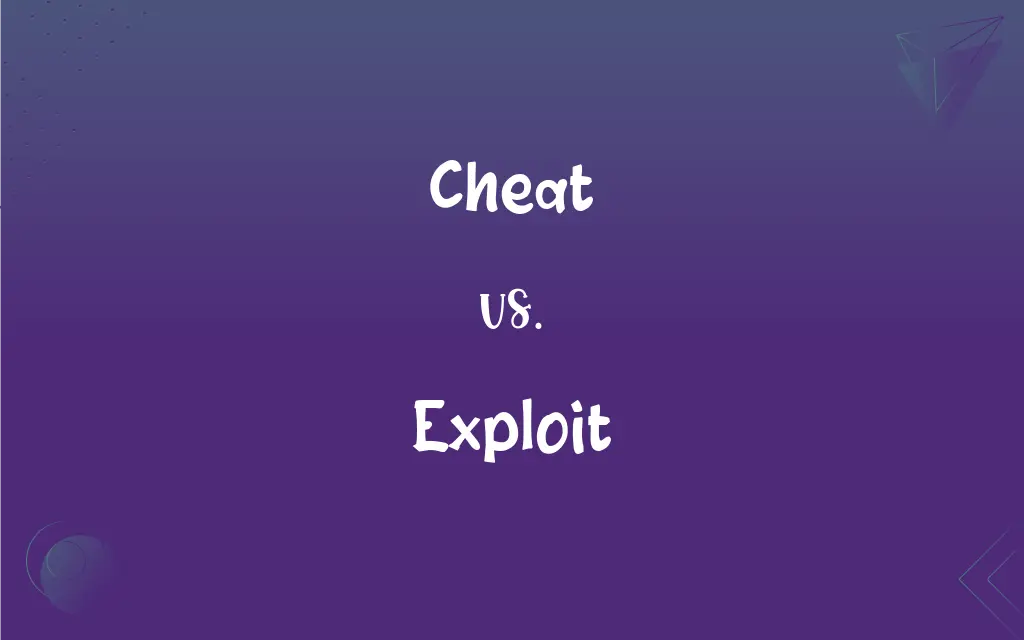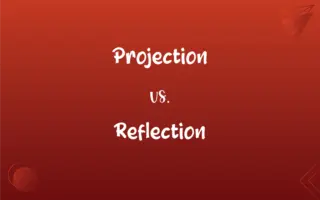Cheat vs. Exploit: What's the Difference?
Edited by Aimie Carlson || By Harlon Moss || Updated on November 2, 2023
Cheat refers to acting dishonestly to gain an advantage, while exploit means to use a situation or resource unfairly for one's own benefit.

Key Differences
To cheat is to deceive or break rules to gain an advantage that is not deserved. To exploit means to take advantage of a particular situation, often unfairly or unethically, for personal gain. Both actions are generally frowned upon, but cheating directly breaks established rules.
Cheating implies a violation of integrity, often to deceive others, as in games, exams, or relationships. Exploiting involves utilizing something or someone to the maximum extent for selfish reasons, which might not involve deception. Cheating alters the fairness of competition, exploit uses the existing conditions to their limit.
In academic settings, to cheat might mean to copy someone’s answers during a test. Exploiting could refer to using loopholes in the rules to gain more time for a project. Cheating is usually secretive, while exploiting can be done openly, without hiding.
In relationships, cheating is betraying a partner’s trust, such as through infidelity. Exploiting in relationships could mean taking advantage of a partner's emotions for personal benefit. Cheating damages trust through deceit, exploit takes advantage of trust already given.
In technology, to cheat might involve using unauthorized code to win a video game. To exploit in this context means to take advantage of a flaw in software to achieve a goal, possibly without breaking specific rules. Cheating affects other users' experience, exploit affects the system's functioning.
ADVERTISEMENT
Comparison Chart
Definition
Deceiving or breaking rules for unfair advantage.
Utilizing a situation or resource for benefit.
Ethical Connotation
Always negative.
Can be negative or neutral.
Legal Implications
Often associated with illegality.
Can be legal, though possibly unethical.
Social Perception
Generally involves direct harm to others.
Might not directly harm others.
Dependency on Context
Tends to be context-specific (e.g., tests, games).
Broader usage in various fields.
ADVERTISEMENT
Cheat and Exploit Definitions
Cheat
A hidden feature in a video game that provides an advantage.
He used a cheat to skip to the final level of the game.
Exploit
A software tool designed to take advantage of a flaw.
A security exploit was used to access confidential data.
Cheat
A person who behaves dishonestly to gain an advantage.
She confronted the cheat who had stolen her business idea.
Exploit
To make full use of and derive benefit from a resource.
The company tends to exploit its workers.
Cheat
To act dishonestly or unfairly to gain an advantage.
He decided to cheat on the exam to get a higher score.
Exploit
A notable or heroic act.
The explorers were celebrated for their daring exploits.
Cheat
An act of cheating; a fraud or deception.
The entire scandal was a cheat orchestrated by a few individuals.
Exploit
To utilize something to the maximum extent for selfish reasons.
They exploit the land's resources without considering environmental impact.
Cheat
To be sexually unfaithful.
They broke up because he cheated with her best friend.
Exploit
To use a situation in a way considered unfair or underhanded.
She was known to exploit her family’s connections to get ahead.
Cheat
To deceive by trickery; swindle
Cheated customers by overcharging them for purchases.
Exploit
An act or deed, especially a brilliant or heroic one. ]
Cheat
To deprive by trickery; defraud
Cheated them of their land.
Exploit
A heroic or extraordinary deed.
FAQs
Can exploit be a positive term?
Yes, when referring to making the best use of resources or skill.
What does it mean to cheat in a game?
It means to break the game’s rules to gain an unfair advantage.
Are all cheats illegal?
Not all, but many forms of cheating, like fraud, are illegal.
Is cheating always intentional?
Yes, cheating involves a conscious decision to deceive or break rules.
Can exploit be a verb and a noun?
Yes, it’s a verb when using something unfairly and a noun for a deed or software tool.
Can you unintentionally exploit someone?
Exploitation usually involves deliberate action, but can sometimes be unintentional.
What makes an action an exploit?
Utilizing something to its fullest potential, often in an unfair manner.
Does cheating require a victim?
Typically, yes; cheating usually involves unfairness to others.
Is cheating a moral issue?
Yes, it’s considered a violation of ethical standards.
Can cheat be used as a verb?
Yes, it’s commonly used as a verb meaning to deceive or act dishonestly.
What’s an example of a beneficial exploit?
A beneficial exploit could be using a legal tax loophole to save money.
Is using a cheat code in a video game illegal?
No, but it’s generally against the game's rules or terms of service.
Are there positive exploits in technology?
Yes, such as when a security researcher responsibly uses an exploit to improve cybersecurity.
What is a security exploit?
It’s a piece of software or a sequence of commands that takes advantage of a bug or vulnerability.
Can you accidentally cheat in a game?
Not typically; cheating in games usually requires a deliberate act.
Do all cultures view cheating the same way?
No, perceptions and definitions of cheating vary across cultures.
Is exploit always associated with computers?
No, exploit has a wider range of meanings beyond technology.
Can exploiting a person lead to legal consequences?
Yes, if it involves abuse, manipulation, or other illegal acts.
Can exploiting be done within the bounds of the law?
Yes, one can exploit something legally, though it may still be unethical.
Is cheat used as a noun?
Yes, referring to a person who cheats or an act of cheating.
About Author
Written by
Harlon MossHarlon is a seasoned quality moderator and accomplished content writer for Difference Wiki. An alumnus of the prestigious University of California, he earned his degree in Computer Science. Leveraging his academic background, Harlon brings a meticulous and informed perspective to his work, ensuring content accuracy and excellence.
Edited by
Aimie CarlsonAimie Carlson, holding a master's degree in English literature, is a fervent English language enthusiast. She lends her writing talents to Difference Wiki, a prominent website that specializes in comparisons, offering readers insightful analyses that both captivate and inform.
































































